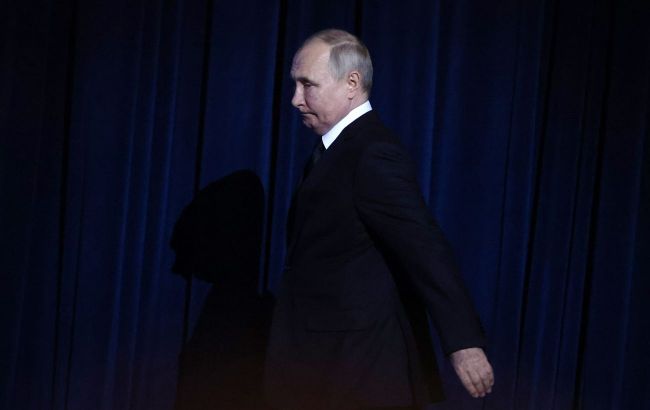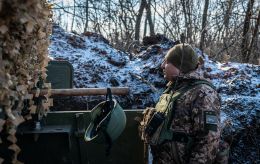Putin faces deadline. Is he ready to negotiate?
 Putin wants to make it as much as possible before Trump's inauguration (photo: GettyImages)
Putin wants to make it as much as possible before Trump's inauguration (photo: GettyImages)
Is Putin ready for negotiations, and if not, does US President-elect Donald Trump have a "stick" or "carrot" to force him to end the war? Abbas Gallyamov, a Russian opposition political analyst living in Israel, answers these questions exclusively for RBC-Ukraine.
Putin is a very secretive person. He says only what he considers necessary to display. His intentions cannot be judged by his words alone. We can infer his real intentions only through indirect signs. He is likely ready to make some concessions during peace talks but doesn't want the world to know about it in advance.
During his year-end speech, something was said that made me think he might be ready. He stated that Russia is prepared for negotiations without any preconditions. In the summer, when issuing an ultimatum to Ukraine ahead of the Swiss peace summit, he demanded that Ukraine renounce joining NATO, after which Russia would cease fire and begin negotiations. So, back then, he had preconditions. Now, he claims not to have them.
Perhaps it was an unfortunate phrasing, or he simply forgot what he had previously declared. After all, he contrasts himself with Zelenskyy, whom he accuses of not wanting peace. This could be a simple lapse - Putin is not as articulate now as he was in his youth. But if it's not a mistake, it signals a softening of his position. Overall, I wouldn't draw many conclusions from his recent statements.
Putin doesn't take the Russian audience seriously enough to tell them the truth. When the time comes, they'll learn the truth, but for now, they're part of the play: "I'm determined; no concessions." He treats Russians like children. In conversations with children, an adult's role is to shield their tender psyche from harsh truths. Putin believes Russians are children who don't need to know life's brutal realities. This fundamentally differs from the dialogue between Western politicians and their societies. There, it's a conversation between equals, like Churchill's: "I have nothing to offer but blood, toil, tears, and sweat.”
Does Putin have resources to continue war?
Every action has its cost. Putin's successes come at the price of immense strain, heavy bloodshed, human lives, enormous financial costs, and significant losses in military equipment. He likely can't sustain this for long. He doesn't even have enough troops to defend the Kursk region, having brought in North Korean soldiers - a clear admission of his inability to cope alone. For him, that's a humiliation.
Putin loves posturing. He'd never call on North Korean soldiers if he believed he could manage on his own. Even if he wins, the fact that he brought in North Korean troops tarnishes his victory - it would no longer be a personal triumph but a coalition's.
The cost of Putin's successes is unreasonably high, and he knows it. His economy is cracking. Even Sergey Chemezov, Head of Rostec State Corporation and Putin's close associate, openly admits that Russia's industry will collapse if things continue as they are. Key sectors like metallurgy and agriculture are operating at significant losses compared to the previous year - down more than 10%, with some metrics showing declines of 15% to 18%.
Another sign: Russia could no longer protect Assad's regime in Syria. Now they're spinning it as if they didn't want to. Moscow entered Syria in 2015, burned through vast sums, and is now withdrawing in disgrace.
Russian society no longer dreams of victory. Anti-war sentiments are growing. Residents of the Kursk region are recording video appeals urging Putin to end the "special military operation." The question is whether Putin sees the situation as critical.
Putin has a clear deadline for achieving results on the frontlines: around January 20, when Trump takes office and formulates his proposal to end the war. The Russian army must show positive momentum for the proposal to favor Putin. Trump must perceive Putin's resources as inexhaustible; only then might he offer terms favorable to Moscow.
Trump's leverage
When introducing his future special envoy for Ukraine and Russia, Keith Kellogg, Trump spoke of "peace through strength." Kellogg embodies this ideology. Thus, the US strategy may be: "Agree to our terms, or we'll increase arms supplies to Ukraine and drive oil prices further down."
It would be unwise for Putin to reject Trump's proposal and hope for better terms. Trump is emotional, and alienating him now would be foolish, even for Putin.
It is necessary to understand that Trump has a much stronger negotiating position because it is not his people who are dying in Ukraine now, it is not his economy that is bursting at the seams. Everything is going very well for Trump right now. Even though the US has its own, other problems, Trump is not yet responsible for these problems, because he will only come to power. They will begin to hang over him no earlier than in a year or a year and a half. In the meantime, he has the right to tell the Americans: "You elected me to correct the mistakes made by the previous administration; I promised to correct them - I am correcting them." And he does not have tight deadlines.
Taking your time when time works for you is a very strong negotiating position. Trump can tell Putin if he persists: "Okay, Vladimir, let's continue fighting, but I still have something to do. If you think of something, call me." After that, Putin will find himself in a very difficult situation because, in a month, Trump may take an even tougher position than before.
Therefore, there is reason to hope that Putin will "act out" until Trump formulates his offer. And when the offer comes, it will be difficult to refuse. Arguing with Trump now, in 2025, when you already know that your army is not as powerful as you thought, your economy is not as resilient, and the people are not as united and patriotic as you expected, is a risk, and it is unwise.

